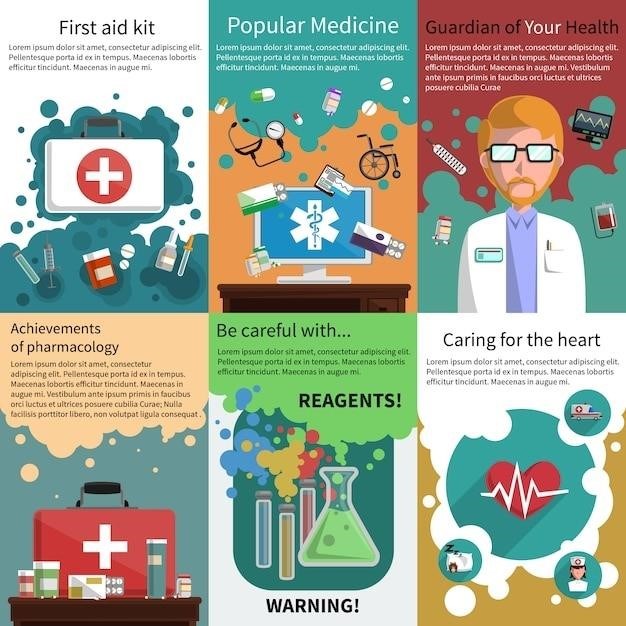
Fundamentals of Nursing⁚ A Comprehensive Overview
This overview explores foundational nursing principles‚ encompassing patient assessment‚ vital signs‚ and essential skills like medication administration and wound care. It also delves into legal and ethical considerations‚ emphasizing professional standards and patient rights. Numerous online resources‚ including PDFs and study guides‚ are available to support learning.
Fundamentals of nursing form the bedrock of nursing practice‚ providing a solid foundation for all subsequent learning and clinical experiences. These fundamentals encompass a broad range of knowledge and skills‚ essential for safe and effective patient care. A thorough understanding of these core principles is crucial for entry-level nurses and serves as a springboard for advanced nursing roles. Many resources are available to help students master these concepts‚ including comprehensive textbooks‚ online modules‚ and practice assessments. These resources often cover key areas such as patient assessment‚ communication‚ and basic nursing procedures. Effective study strategies and consistent practice are vital for success in mastering nursing fundamentals. The ability to apply these fundamental principles in real-world scenarios is essential for providing high-quality patient care and achieving positive clinical outcomes. Access to various learning materials‚ such as downloadable PDFs and online courses‚ enhances the learning process significantly. The integration of theoretical knowledge with practical application is a cornerstone of effective learning in nursing fundamentals. A strong foundation in fundamentals ensures nurses are well-equipped to handle diverse clinical situations confidently and competently.
Key Concepts in Nursing Practice
Central to effective nursing practice are several key concepts that guide decision-making and actions. These concepts‚ often explored in detail within fundamentals of nursing textbooks and online resources (including readily available PDFs)‚ provide a framework for understanding patient needs and delivering holistic care. The nursing process‚ a systematic approach involving assessment‚ diagnosis‚ planning‚ implementation‚ and evaluation‚ is a cornerstone of practice. Patient-centered care‚ prioritizing individual needs and preferences‚ is paramount. Evidence-based practice‚ utilizing research findings to inform clinical decisions‚ ensures the delivery of high-quality care. Collaboration with the interprofessional healthcare team is crucial for optimizing patient outcomes. Critical thinking skills are essential for analyzing situations‚ identifying problems‚ and developing appropriate interventions. Safety‚ both for patients and healthcare providers‚ is a non-negotiable priority. Finally‚ ethical considerations‚ including patient autonomy and confidentiality‚ must always guide clinical practice. Understanding and applying these key concepts is fundamental to becoming a competent and compassionate nurse. Many readily available resources‚ from comprehensive textbooks to concise online summaries‚ can help solidify this understanding.
Patient Assessment and Vital Signs
Patient assessment forms the bedrock of nursing care‚ providing the crucial information needed to develop effective care plans. A comprehensive assessment encompasses a thorough review of the patient’s medical history‚ current symptoms‚ and lifestyle factors. This process involves skillful observation‚ questioning‚ and physical examination techniques. Vital signs—temperature‚ pulse‚ respiration rate‚ and blood pressure—are fundamental components of assessment‚ providing objective data about a patient’s physiological status. Accurate measurement and interpretation of vital signs are essential for detecting deviations from normal ranges and identifying potential problems. The collection and analysis of this data inform nursing diagnoses and guide subsequent interventions. Understanding the normal ranges for vital signs‚ as well as factors that can influence them‚ is crucial for accurate interpretation and timely intervention. Many nursing fundamentals textbooks and online resources‚ including readily accessible PDFs‚ offer detailed guidance on performing accurate assessments and interpreting vital signs. This knowledge is vital for safe and effective nursing practice.

Essential Nursing Skills and Procedures
This section covers fundamental nursing skills crucial for safe and effective patient care. Many resources‚ including online PDFs‚ detail these procedures‚ emphasizing proper technique and safety protocols.
Medication Administration and Safety
Safe and effective medication administration is a cornerstone of nursing practice. This crucial skill requires a thorough understanding of pharmacology‚ dosage calculations‚ and the various routes of administration (oral‚ intravenous‚ intramuscular‚ subcutaneous). Nurses must meticulously follow the “five rights” – right patient‚ right medication‚ right dose‚ right route‚ and right time – to prevent medication errors. Detailed procedures for each route are available in numerous nursing textbooks and online resources‚ including downloadable PDFs. These resources often include checklists and algorithms to aid in the process‚ emphasizing the importance of double-checking medication orders and patient allergies. Furthermore‚ understanding the potential side effects and contraindications of medications is essential for patient safety and effective monitoring. Documentation of medication administration‚ including the time‚ route‚ and patient response‚ is critical for legal and clinical accountability. Regular continuing education and adherence to institutional policies are vital for maintaining competency and ensuring patient safety in this critical area of nursing.
Wound Care and Dressing Changes
Competent wound care is a fundamental nursing skill encompassing assessment‚ cleaning‚ and dressing changes. Accurate assessment involves evaluating the wound’s size‚ depth‚ location‚ presence of infection (signs of redness‚ swelling‚ drainage‚ pain)‚ and surrounding skin condition. Cleaning techniques vary depending on the wound type; some require sterile saline‚ while others may use gentle soap and water. Dressing selection is crucial‚ with choices ranging from simple gauze pads to specialized dressings for specific wound types‚ like hydrocolloids or alginates. The principles of asepsis are paramount to prevent infection‚ requiring meticulous hand hygiene and the use of sterile gloves and equipment. Proper techniques for applying and removing dressings minimize patient discomfort and prevent trauma. Documentation of wound assessment‚ cleaning‚ and dressing changes is crucial‚ including descriptions of the wound’s appearance and any complications observed. Many online resources‚ including detailed PDFs and instructional videos‚ guide nurses in mastering these essential techniques‚ emphasizing the importance of patient education and follow-up care. Regular updates and adherence to evidence-based practices ensure optimal wound healing and prevent complications.
Basic Infection Control Techniques
Effective infection control is paramount in nursing‚ preventing the spread of pathogens and protecting both patients and healthcare workers. Fundamental techniques include meticulous hand hygiene‚ using alcohol-based hand rubs or soap and water‚ before and after patient contact‚ and following procedures. Appropriate use of personal protective equipment (PPE)‚ such as gloves‚ gowns‚ masks‚ and eye protection‚ is crucial when handling bodily fluids or caring for patients with infectious diseases. Understanding and adhering to standard precautions‚ treating all patients as potentially infectious‚ is essential. Environmental hygiene‚ including regular cleaning and disinfection of surfaces and equipment‚ plays a vital role. Proper waste disposal‚ separating infectious waste from non-infectious waste‚ prevents contamination. Aseptic techniques‚ maintaining a sterile field during procedures like wound dressing changes or intravenous line insertion‚ minimize the risk of introducing pathogens. Knowledge of transmission-based precautions‚ such as airborne‚ droplet‚ and contact precautions‚ guides infection control strategies for specific pathogens. Many online resources‚ including detailed infection control protocols and training materials in PDF format‚ support nurses in maintaining a safe and hygienic environment. Regular updates and adherence to evidence-based practices are essential for optimal infection prevention and control.

Legal and Ethical Considerations in Nursing
This section addresses crucial legal and ethical aspects of nursing practice. It covers professional standards‚ accountability‚ patient rights‚ and maintaining confidentiality‚ all essential for responsible and ethical care. Numerous online resources‚ including PDFs and guidelines‚ offer further information.
Professional Standards and Accountability
Maintaining professional standards is paramount in nursing. Nurses are expected to adhere to a strict code of ethics‚ ensuring patient safety and well-being are prioritized above all else. Accountability is a cornerstone of this; nurses must be responsible for their actions and decisions‚ constantly striving for excellence in patient care. This involves continuous professional development‚ staying abreast of the latest advancements and best practices in the field. Adherence to established protocols and guidelines is essential to minimize errors and maintain a high standard of care. Moreover‚ nurses are accountable to their regulatory bodies and legal frameworks‚ always operating within the boundaries of their scope of practice. Documentation plays a vital role in demonstrating accountability. Meticulous record-keeping ensures a clear and comprehensive account of patient interactions‚ treatment plans‚ and outcomes. It also serves as a crucial legal record should any disputes or inquiries arise. Open communication with colleagues‚ supervisors‚ and patients themselves is equally important in upholding professional standards and maintaining accountability. By fostering a culture of transparency and collaboration‚ nurses can contribute to a safe and efficient healthcare environment. Finally‚ reflecting on practice and seeking feedback are essential steps in continuous improvement‚ ensuring accountability is not just a reactive measure but a proactive commitment to excellence.
Patient Rights and Confidentiality
Respecting patient rights is fundamental to ethical nursing practice. Patients possess the right to make informed decisions about their care‚ including the right to refuse treatment. Nurses must ensure patients understand their options and the implications of their choices‚ fostering autonomy and self-determination. Confidentiality is another cornerstone of patient rights. All information obtained during patient care‚ including medical history‚ diagnoses‚ and treatment details‚ must be kept strictly private. This information should only be shared with authorized individuals involved in the patient’s care‚ adhering to strict legal and ethical guidelines. Breaches of confidentiality can have serious legal and ethical ramifications. Nurses must be vigilant in protecting patient data‚ both in physical and electronic formats. This includes secure storage of records‚ responsible use of technology‚ and adherence to data protection policies. Open communication with patients about their rights and how their information is handled is crucial. Nurses should explain confidentiality procedures and answer any questions patients may have‚ fostering trust and transparency. Advocating for patient rights extends beyond confidentiality. Nurses play a key role in ensuring patients receive the care they need and are treated with dignity and respect. This includes protecting patients from harm‚ speaking up when concerns arise‚ and ensuring their voices are heard in the healthcare process. A commitment to patient rights and confidentiality is essential to building a trusting relationship and providing high-quality‚ ethical care.